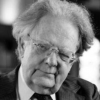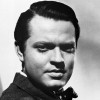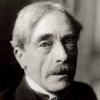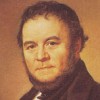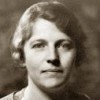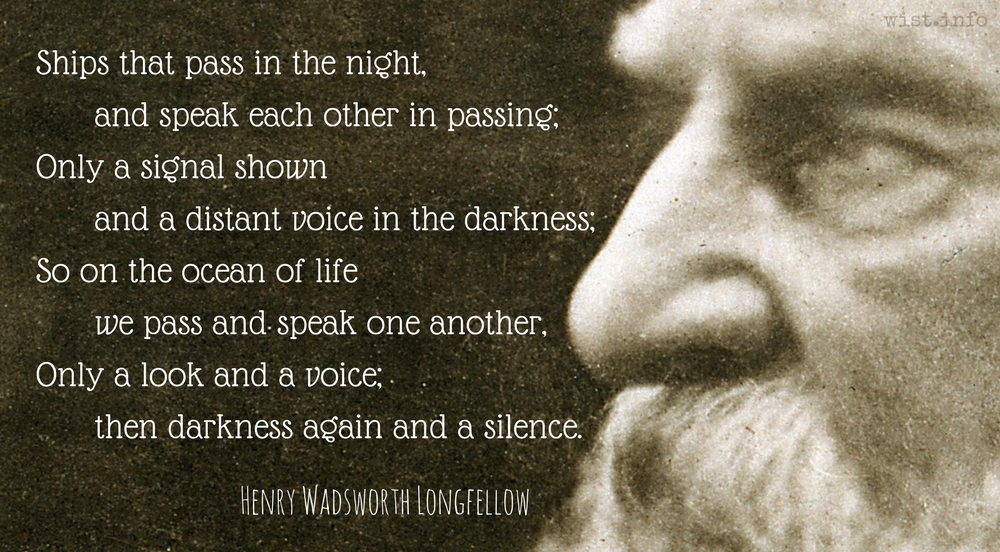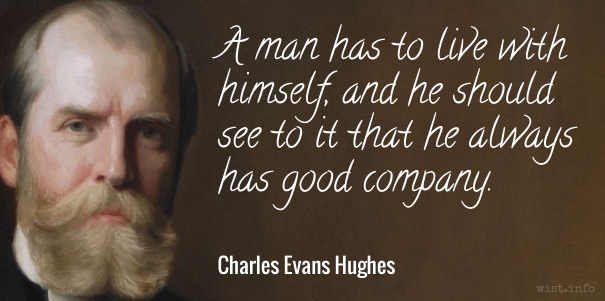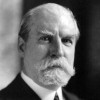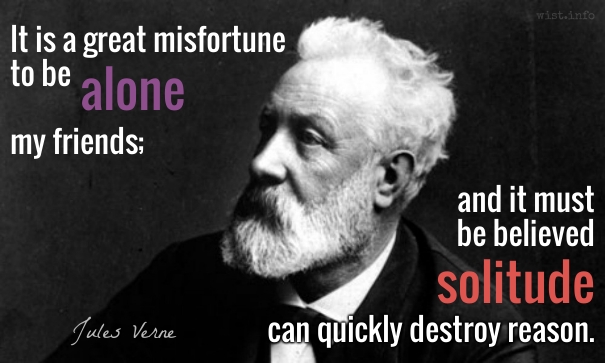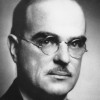If you are looking after happiness don’t take the turnpike, take one ov the byroads, yu will avoid the tollgates, and find it less crowded and dursty.
[If you are looking after happiness, don’t take the turnpike, take one of the byroads; you will avoid the tollgates, and find it less crowded and dusty.]
Josh Billings (1818-1885) American humorist, aphorist [pseud. of Henry Wheeler Shaw]
Everybody’s Friend, Or; Josh Billing’s Encyclopedia and Proverbial Philosophy of Wit and Humor, ch. 132 “Affurisms: Chips” (1874)
(Source)
Quotations about:
solitude
Note not all quotations have been tagged, so Search may find additional quotes on this topic.
Where the heart is in the giving, there is no question of goods that are being traded thriftily. In giving, you throw a bridge across the chasm of your solitude.
Antoine de Saint-Exupéry (1900-1944) French writer, aviator
Citadelle [The Wisdom of the Sands], ch. 46 (1948) [tr. Gilbert (1950)]
(Source)
Civilization has taught us to eat with a fork, but even now if nobody is around we use our fingers.
Better to sink beneath the shock
Than moulder piecemeal on the rock!
There are many people who want (or think they want) silence, solitude, and unspoiled nature just enough to push into and destroy all three. They will push as far as, but no farther than, good roads will take them.
Joseph Wood Krutch (1893-1970) American educator, writer, critic, naturalist
Baja California and the Geography of Hope, “Introduction” (1967)
(Source)
A voyage without companionship, that is to say without conversation, is one of the saddest pleasures of life.
Germaine de Staël (1766-1817) Swiss-French writer, woman of letters, critic, salonist [Anne Louise Germaine de Staël-Holstein, Madame de Staël, Madame Necker]
Quoted in Margaret Goldsmith, Madame de Staël (1938)
See also here.
No doubt about it, solitude is improved by being voluntary.
Barbara Holland (1933-2010) American author
One’s Company: Reflections on Living Alone (1996)
(Source)
One person by himself is not a complete human being.
Northrop Frye (1912-1991) Canadian literary critic and literary theorist
The Educated Imagination, Talk 1 “The Motive for Metaphor” (1963)
(Source)
there are worse things than
being alone
but it often takes decades
to realize this
and most often
when you do
it’s too late
and there’s nothing worse
than
too late.Charles Bukowski (1920-1994) German-American author, poet
“Oh Yes,” You Get So Alone At Times That It Just Makes Sense (1986)
(Source)
It can be difficult to be an introvert in church, especially if you happen to be the pastor. Liking to be alone can be interpreted as a judgment on other people’s company. Liking to be quiet can be construed as aloofness. There is so much emphasis on community in most congregations that anyone who does not participate risks being labeled a loner.
Barbara Brown Taylor (b. 1951) American minister, academic, author
An Altar in the World, ch. 7 (2009)
(Source)
I don’t hate people, I just feel better when they aren’t around.
Charles Bukowski (1920-1994) German-American author, poet
Barfly (1987)
(Source)
From the movie screenplay by Bukowski.
This is the way the phrase is usually quoted, but it's actually a series of lines when Henry (a character standing in for Bukowski himself) first meets Wanda.
WANDA: I can't stand people. I hate them.
HENRY: Yeah?
WANDA: You hate them?
HENRY: No, but I seem to feel better when they're not around.
Bukowski is actually in the scene as the barfly closest to Wanda before Henry moves next to her. Video clip.
Real loneliness is not necessarily limited to when you are alone.
Charles Bukowski (1920-1994) German-American author, poet
sifting through the madness for the Word, the line, the way, Part 2, epigram (2003)
(Source)
The book was reprinted as New Poems, Book Two (2011).
Loneliness is the poverty of self; solitude is the richness of self.
I can tell you that solitude
Is not all exaltation, inner space
Where the soul breathes and work can be done.
Solitude exposes the nerve,
Raises up ghosts.
The past, never at rest, flows through it.May Sarton (1912-1995) Belgian-American poet, novelist, memoirist [pen name of Eleanore Marie Sarton]
“Gestalt at Sixty,” sec. 1 (1972)
(Source)
There is no doubt that solitude is a challenge and to maintain balance within it a precarious business. But I must not forget that, for me, being with people or even with one beloved person for any length of time without solitude is even worse. I lose my center. I feel dispersed, scattered, in pieces. I must have time alone in which to mull over my encounter, and to extract its juice, its essence, to understand what has really happened to me as a consequence of it.
May Sarton (1912-1995) Belgian-American poet, novelist, memoirist [pen name of Eleanore Marie Sarton]
Journal of a Solitude (1973)
(Source)
Every work of art is one half of a secret handshake, a challenge that seeks the password, a heliograph flashed from a tower window, an act of hopeless optimism in the service of bottomless longing. Every great novel or comic book convenes the first meeting of a fan club whose membership stands forever at one but which maintains chapters in every city — in every cranium — in the world. Art, like fandom, asserts the possibility of fellowship in a world built entirely from the materials of solitude.
You ask me how my farm can pay,
Since little it will bear;
It pays me thus — ‘Tis far away
And you are never there.[Quid mini reddat ager quaeris, Line, Nomentanus?
Hoc mini reddit ager: te, Line, non video.]Martial (AD c.39-c.103) Spanish Roman poet, satirist, epigrammatist [Marcus Valerius Martialis]
Epigrams [Epigrammata], Book 2, epigram 38 (2.38) (AD 86) [tr. Pott & Wright (1921)]
(Source)
Original Latin. Alternate translations:
Linus, dost ask what my field yields to me?
Even this profit, that I ne'er see thee.
[tr. Fletcher (1656)]
What my farm yields me, doest thou urge to know?
This, that I see not thee, when there I go.
[tr. Killigrew (1695)]
Do you ask what profit my Nomentan estate brings me, Linus? My estate brings me this profit, that I do not see you, Linus.
[tr. Bohn's Classical (1860)]
Ask you what my Nomentane fields
Can yield me, Linus, bleak and few?
For me my farm this, Linus, yields;--
That, when I'm there, I'm rid of you.
[tr. Webb (1879)]
You ask what I grow on my Sabine estate.
A reliable answer is due.
I grow on that soil --
Far from urban turmoil --
Very happy at not seeing you.
[tr. Nixon (1911)]
Do you ask, Linus, what my Nomentan farm returns me? This my land returns me: I don't see you, Linus.
[tr. Ker (1919)]
You ask of my Nomentan farm
How such a barren waste can charm.
One reason is, I find no trace
There, Linus, of your ugly face.
[tr. Francis & Tatum (1924), #83]
Linus, you mock my distant farm,
And ask what good it is to me?
Well, it has got at least one charm --
When there, from Linus I am free!
[tr. Duff (1929)]
You don't see what I see, you say,
In living here so far away?
What I see, Linus, is a view
In which I see no sign of you.
[tr. Marcellino (1968)]
What return on my real estate at Nomentum?
Up there i get out of seeing you, Linus.
That's what I get out of it.
[tr. Bovie (1970)]
You ask me what I get
Out of my country place.
The profit, gross or net,
Is never seeing your face.
[tr. Michie (1972)]
Linus, you ask me what I get out of my land near Nomentum. This is what I get out of the land: I don't see you, Linus.
[tr. Shackleton Bailey (1993)]
You ask what my estate at Nomentum produces for me? It produces this: that I don't see you, Linus.
[tr. Williams (2003)]
You ask me why I like the country air.
I never meet you there.
[tr. Kennelly (2004), "The Reason"]
You ask what I see in my farm near Nomentum, Linus?
What I see in it, Linus, is: from there I can’t see you.
[tr. Kline (2006)]
What, Linus, can my farm be minus
When it successfully lacks Linus?
[tr. Wills (2007)]
You ask me why I like the country air.
I never meet you there.
[tr. Kennelly (2008)]
What yield does my Nomentan farmstead bear?
Linus, I don’t see you when I am there.
[tr. McLean (2014)]
You're wondering what the yield is from my farm at Nomentum, Linus? Here's the yield form my farm: Linus, I don't have to look at you.
[tr. Nisbet (2015)]
You ask me why I love fresh country air?
You’re not befouling it there.
[tr. Burch (c. 2017)]
You ask me why I choose to live elsewhere? You're not there.
[tr. Burch (c. 2017)]
Ask you what my Nomentane field brings me?
This, Linus, 'mongst the rest, I ne'er see thee.
[tr. Wright]
You wonder if my farm pays me its share?
It pays me this: I do not see you there.
[tr. Oliver]
You ask me, Roger, what I gain
By living on this barren plain.
This credit to the spot is due,
I live there without seeing you.
[tr. Cowper]
If a man should ascend alone into heaven and behold clearly the structure of the universe and the beauty of the stars, there would be no pleasure for him in the awe-inspiring sight, which would have filled him with delight if he had had someone to whom he could describe what he had seen.
[Si quis in coelum ascendisset, naturamque mundi, et pulchritudinem siderum perspexisset, insuavem illam admirationem ei fore; quae jucudissima fuisset, si aliquem, cui narraret, habuisset.]
Marcus Tullius Cicero (106-43 BC) Roman orator, statesman, philosopher
Laelius De Amicitia [Laelius on Friendship], ch. 23 / sec. 88 (44 BC) [tr. Falconer (1923)]
(Source)
Original Latin. Cicero attributes this as a paraphrase of Archytas of Tarentum (d. 394 BC), a Pythagorean philosopher and astronomer. Alternate translations:
If any one could have ascended to the sky, and surveyed the structure of the universe, and the beauty of the stars, that such admiration would be insipid to him; and yet it would be most delightful if he had someone to whom he might describe it.
[tr. Edmonds (1871)]
If one had ascended to heaven, and had obtained a full view of the nature of the universe and the beauty of the stars, yet his admiration would be without delight, if there were no one to whom he could tell what he had seen.
[tr. Peabody (1887)]
If a man could ascend to heaven and get a clear view of the natural order of the universe, and the beauty of the heavenly bodies, that wonderful spectacle would give him small pleasure, though nothing could be conceived more delightful if he had but had some one to whom to tell what he had seen.
[tr. Shuckburgh (1909)]
If a man could mount to heaven and survey the mighty universe with all the planetary orbs, his admiration of its beauties would be much diminished, unless he had someone to share in his pleasure.
[Source]
ANN ANDERSON: Here’s something else you must remember: husbands like to be alone once in awhile.
JENNIE ANDERSON: Why?
ANN ANDERSON: You never know why, but I can always tell when James wants to be alone. A mood comes over him. I can always see it in his eyes before it gets there. I don’t know where the mood comes from or why, but that’s when I leave him alone. It seems sometimes things get so fickle in a man that he comes to feel that everything is closing in on him — and that’s when he wants to be left alone. You understand, don’t you?
JENNIE ANDERSON: No!
We’re born alone, we live alone, we die alone. Only through our love and friendship can we create the illusion for the moment that we’re not alone.
Self-pity? I see no moral objections to it, the smell drives people away, but that’s a practical objection, and occasionally an advantage.
E. M. Forster (1879-1970) English novelist, essayist, critic, librettist [Edward Morgan Forster]
Commonplace Book (1985) [ed. Gardner]
(Source)
Solitude is not lack.
Laurie Helgoe (b. 1960) American psychologist and author
Introvert Power, ch. 2 (2008)
(Source)
Sometimes misquoted "Solitude is not a lack."
One can acquire everything in solitude, except character.
Stendhal (1783-1842) French writer [pen name of Marie-Henri Beyle]
On Love, Book 3 “Fragments” (1822)
(Source)
Absence is one of the most useful ingredients of family life, and to do it rightly is an art like any other.
Freya Stark (1893-1993) Franco-British explorer, travel writer [Freya Madeline Stark]
The Freya Stark Story (1953)
(Source)
It is sometimes said of a man who lives alone that he does not like society. This is like saying of a man he does not like going for walks because he is not fond of walking at night in the forêt de Bondy.
[On dit quelquefois d’un homme qui vit seul: il n’aime pas la Société. C’est souvent comme si on disait d’un homme qu’il n’aime pas la promenade, sous le prétexte qu’il ne se promène pas volontiers le soir dans la forêt de Bondy.]
To ensure moral salvation, it is primarily necessary to depend on oneself, because in the moment of peril we are alone. And strength is not to be acquired instantaneously. He who knows that he will have to fight, prepares himself for boxing and dueling by strength and skill; he does not sit still with folded hands.
The world today does not understand, in either man or woman, the need to be alone. How inexplicable it seems. Anything else will be accepted as a better excuse. If one sets aside time for a business appointment, a trip to the hairdresser, a social engagement or a shopping expedition, that time is accepted as inviolable. But if one says: I cannot come because that is my hour to be alone, one is considered rude, egotistical or strange. What a commentary on our civilization, when being alone is considered suspect; when one has to apologize for it, make excuses, hide the fact that one practices it — like a secret vice!
Be able to be alone. Loose not the advantage of Solitude, and the Society of thy self, nor be only content, but delight to be alone and single with Omnipresency.
Thomas Browne (1605-1682) English physician and author
Christian Morals, Part 3, sec. 9 (1716)
(Source)
I love people. I love my family, my children … but inside myself is a place where I live all alone and that’s where you renew your springs that never dry up.
Ships that pass in the night, and speak each other in passing;
Only a signal shown and a distant voice in the darkness;
So on the ocean of life we pass and speak one another,
Only a look and a voice; then darkness again and a silence.
Henry Wadsworth Longfellow (1807-1882) American poet
Tales of a Wayside Inn, Part 3 “The Theologian’s Tale: Elizabeth” part 4 (1874)
(Source)
A talent forms itself in solitude,
A character amid the stream of life.[Es bildet ein Talent sich in der Stille,
Sich ein Charakter in dem Strom der Welt.]Johann Wolfgang von Goethe (1749-1832) German poet, statesman, scientist
Torquato Tasso, Act 1, sc. 2, ll. 304-305 [Leonora] (1790) [tr. Ryder (1993)]
(Source)
(Source (German)). Alternate translations:
- "A talent doth in stillness form itself -- / A character on life's unquiet stream." [tr. Des Voeux (1827)]
- "Talents are nurtured best in solitude, -- / A character on life's tempestuous sea." [tr. Swanwick (1843)]
- "Man's talent ripens in tranquility, / His character in battling with the world." [tr. Cartwright (1861)]
- "A talent in tranquility is formed, / A character in the turbulence of affairs." [tr. Hamburger (20th C)]
- "Talent develops in quiet places, / Character in the full current of human life."
- Talents are best nurtured in solitude; / Character is best formed in the stormy billows of the world.
- "Genius is formed in quiet, / Character in the stream of human life."
No one can be happy in eternal solitude.
Anne Brontë (1820-1849) British novelist, poet [pseud. Acton Bell]
The Tenant of Wildfell Hall, ch. 7 “The Excursion” [Helen] (1848)
(Source)
It is a great misfortune to be alone, my friends; and it must be believed that solitude can quickly destroy reason.
[Malheur à qui est seul, mes amis, et il faut croire que l’isolement a vite fait de détruire la raison.]
Jules Verne (1828-1905) French novelist, poet, playwright
The Mysterious Island, Part 2, ch. 15 (1874) [tr. White (1876)]
(Source)
I just have one of those faces. People come up to me and say, “What’s wrong?” Nothing. “Well, it takes more energy to frown than it does to smile.” Yeah, you know it takes more energy to point that out than it does to leave me alone?
It is easy in the world to live after the world’s opinion; it is easy in solitude to live after our own. But the great man is he who in the midst of the crowd keeps with perfect sweetness the independence of solitude.
I’m rarely bored alone; I am often bored in groups and crowds.
Laurie Helgoe (b. 1960) American psychologist and author
Introvert Power, ch. 1 (2008)
(Source)
Usually attributed to Helgoe, but cited in the book to "Don, Minnesota."
Piety practised in solitude, like the flower that blooms in the desert, may give its fragrance to the winds of heaven, and delight those unbodied spirits that survey the works of God and the actions of men; but it bestows no assistance upon earthly beings, and however free from taints of impurity, yet wants the sacred splendour of beneficence.
Samuel Johnson (1709-1784) English writer, lexicographer, critic
The Adventurer, #126 “Praises of Solitude”
(Source)
If we are to survive, we must have ideas, vision, courage. These things are rarely produced by committees. Everything that matters in our intellectual and moral life begins with an individual confronting his own mind and conscience in a room by himself.
Something of the hermit’s temper is an essential element in many forms of excellence, since it enables a man to resist the lure of popularity, to pursue important work in spite of general indifference or hostility, and arrive at opinions which are opposed to prevalent errors.
Those who retire from the world on akount ov its sin and peskyness must not forgit that they hav got tew keep kompany with a person who wants just as much watching as ennyboddy else.
[Those who retire from the world on account of its sin and peskiness must not forget that they have got to keep company with a person who wants just as much watching as anybody else.]
Endeavor to make thy own Company pleasant to thee.
Thomas Fuller (1654-1734) English physician, preacher, aphorist, writer
Introductio ad Prudentiam, Vol. 1, # 99 (1725)
(Source)
A wize man never enjoys himself so mutch, nor a phool so little, az when alone.
[A wise man never enjoys himself so much, nor a fool so little, as when alone.]
You come into the world alone and you go out of the world alone yet it seems to me you are more alone while living than even going and coming.
Emily Carr (1871-1945) Canadian artist and writer
Hundreds and Thousands: The Journals of Emily Carr, “16 July 1933” (1966)








